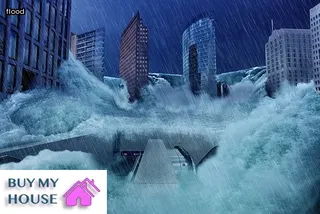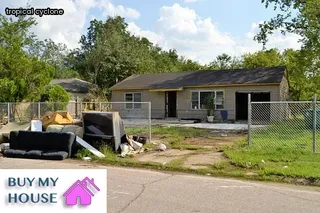Water hazards and floods can have a devastating effect on the value of a house, causing irreversible damage in some cases. It is important to be aware of the potential danger that flood waters can bring, as well as the long-term impact it can have on property values.
Floods can occur at any time of year and for a variety of reasons, including heavy rains, melting snow, and coastal storms. Depending on where a house is located, homeowners may need to take extra precautions such as building stronger walls or purchasing flood insurance.
Knowing how to prepare for a flood and understanding the dangers associated with water hazards can help protect both individuals and their property from becoming victims of flooding. Additionally, being aware of the effects that flooding has on house values is essential in making informed decisions when it comes to investing in real estate.
Taking steps to document any existing damage caused by flooding or water hazards can also be beneficial when attempting to receive compensation or insurance payouts after an incident occurs.

In the wake of increasingly severe weather events, it is important to ensure that you are taking the necessary steps to protect your property from flooding. The devastating impact of flooding on house values can be disastrous for homeowners, and it is essential that you take preventive measures such as sealing cracks in foundations, installing sump pumps and backflow valves, as well as raising any electric outlets.
You should also consider investing in flood-resistant building materials such as concrete blocks, drywall and ceramic tile. Additionally, having a plan in place to quickly move furniture and other valuables to higher ground can help minimize damage if flooding does occur.
Taking these precautions will help minimize the risk of flooding damage to your home and its value in the long run.
Floods can have a devastating effect on the value of a home. When a house is located in an area prone to flooding, it can cause significant damage and make the property far less desirable to potential buyers.
Understanding the impact that floods have on house values is essential for homeowners living in these vulnerable areas. Homeowners should take steps to reduce the risk of flood damage, such as investing in sandbags, raising foundations, and installing sump pumps or other systems designed to prevent flooding.
Additionally, they should research the history of their home and neighborhood to assess how likely it is that flooding will occur and determine if insurance coverage is necessary. By taking proactive steps to mitigate risk, owners can protect their houses from floods and ensure its long-term value stays intact.

After a home floods, it is essential to take immediate action to minimize the damage. The first step is to contact your insurance company right away and make sure you have coverage.
Depending on the severity of the flooding, you may also need to hire a professional contractor to assess the damage and help with repairs. Additionally, it is important to document any damage that occurs with written notes, photos, or videos so that you can provide proof of the damage when filing an insurance claim.
Before beginning the cleanup process, check for any signs of structural instability caused by water saturation in walls or floors and make sure all electrical systems are functioning safely. To prevent further water damage and mold growth, thoroughly dry out all affected areas as soon as possible using fans and dehumidifiers.
Finally, be aware of how flooding could affect your home's value in the future as research has shown that flood-damaged homes often suffer a decrease in market value.
Calculating the cost of repairing a flood-damaged home requires an understanding of the extent of the damage and the materials needed to return it to its pre-flood condition. Conducting a thorough inspection is essential in order to determine the types of repairs that are necessary.
This includes examining both the exterior and interior of the building, paying attention to visible signs of water damage such as warped floorboards and mold growth. Depending on how long the property has been submerged, certain items like insulation may have to be replaced.
Homeowners can expect costs to increase if structural damage was sustained, as this will require specialized labor for repairs or rebuilding. Additionally, items such as furniture and appliances should be evaluated for replacement or repair depending on their condition after flooding.
Understanding these factors can help homeowners prepare a budget for restoring their flood-damaged home and protect them from additional financial hardship caused by discovering unexpected expenses.

When it comes to dealing with flood damage to a property, homeowners have two main options: they can either sell the property as is or repair it and try to bring it back to its pre-flood state. Selling a flood damaged home can be beneficial in that it relieves the homeowner of any potential repairs or maintenance costs associated with getting the house back up to code.
However, selling a flooded house could also mean taking a financial hit in terms of its value. On the other hand, repairing the damage can be costly but may ultimately result in increased house values due to improvements made after the flooding event.
It’s important for homeowners to weigh both of these options carefully when deciding on how best to deal with flood damage and consider factors such as insurance coverage, local regulations, and cost estimates from contractors before making their decision. Furthermore, homeowners should research the long-term impact of flooding on their local real estate market in order to get an accurate picture of how much their house is worth post-flooding and what kind of return on investment they can expect from investing in repairs.
The unfortunate reality of living in an area that is prone to flooding is that it can have a devastating effect on the value of a house. When a flood damages a property, many prospective buyers will shy away from it due to the risks and costs associated with repairing the damage.
For homeowners looking to sell their flood-damaged houses, this presents an enormous challenge. Not only must they contend with finding a buyer willing to take on the risk and cost of repairs, but they also must do so while competing with other houses in the area that are not damaged by flooding.
This means they will likely have to accept a lower offer than what they originally expected or hoped for. Furthermore, due to the amount of time and money required for repairs, most buyers will be unable to secure financing through traditional lenders and may be forced to look for alternative sources of funding in order to purchase the damaged property.
In short, selling a flood-damaged house can be incredibly expensive and time consuming, making it difficult for homeowners looking for quick returns on their investment.

When flooding occurs, it can have a devastating effect on the value of homes in the affected area. Property owners should take steps to minimize the damage caused by a water hazard.
To begin with, waterproofing is an essential step that should be taken before flooding happens. Installing sump pumps and backflow valves can help keep water from entering your home.
Additionally, homeowners should regularly check their gutters and downspouts to make sure they are not clogged or leaking. If possible, elevating important items like furniture and electronics above ground level can also reduce damage during a flood event.
Homeowners may also want to consider investing in flood insurance to protect their property in case of an emergency. Finally, it is important to create an emergency plan that outlines what steps need to be taken if a flood does occur.
By taking these steps, homeowners can help mitigate the impact of flooding on their house values.
Research on the long-term effects of flooding on property value have revealed devastating impacts. Studies have shown that homes located in areas prone to flooding can suffer significant drops in market value, with some estimates finding a decrease of as much as 25%.
This loss of value is due to an increased perception of risk among potential buyers and insurers, which leads to fewer offers and higher insurance premiums. Additionally, the costs associated with flood damage repairs can be substantial, further reducing the overall value of a home.
In addition to these financial losses, homeowners who experience frequent floods may experience mental health issues due to the emotional toll that comes with repeated destruction of their property. These long-term effects are compounded by the fact that flooding is expected to become more frequent and severe as climate change continues.
Consequently, it is important for homeowners living in areas at risk for flooding to take precautions such as purchasing flood insurance and making improvements that reduce their home’s vulnerability.

As water hazards increase due to flooding, many homeowners are left wondering what kind of impact it will have on their house values. Experts suggest that floods can cause a decrease in value for a variety of reasons, including damage to the structure and foundation of a home, increased insurance premiums, and reduced access to amenities.
When assessing the potential impact of flooding on your home's value, it is important to understand how the flood zone designation system works. Flood zone designations determine which areas are prone to flooding and may require flood insurance.
Additionally, it is essential to ensure that your home meets all local building codes and requirements related to flooding. It is also wise to research the likelihood of future flooding in your area, as well as local regulations regarding flood mitigation measures.
Finally, be sure to research recent sales data for comparable homes in order to get an accurate assessment of the potential impact of water hazards on your home's value.
When covering natural disaster stories, journalists must take special care to ensure they bring out the full impact of the situation. This is especially true when it comes to flooding, which can cause a devastating decrease in house values.
It’s important to consider the various factors that contribute to this drop, such as the extent of water damage, how long it takes for property to dry out and be restored, and if properties remain habitable after a flood. In addition, reporters need to consider what happens next – will homeowners be able to sell their homes at all or will they be forced into foreclosure? It is also important to investigate what kind of assistance homeowners may have access too following a flood and how well those resources are being used.
Ultimately, by carefully researching these aspects of a flooding story, journalists can paint an accurate picture of its effects on house values in order for us all to better understand its devastating consequences.

The potential for property damage due to flooding is a risk that cannot be ignored. As global warming and extreme weather events become more frequent, the likelihood of flooding increases significantly.
In particular, coastal regions are particularly vulnerable to water hazards, with rising sea levels putting homes at greater risk of destruction. It is therefore essential to explore solutions which can help reduce the risks of flooding so that homeowners can protect their houses and investments while also helping to minimize any devastating impacts on house values.
Measures such as raising the elevation of a home or building flood walls can act as deterrents against water damage if implemented correctly and in combination with other preventative approaches, like improved urban planning, they can help protect homeowners from potentially catastrophic financial losses. Additionally, better education around flood prevention techniques will help ensure that people understand how to best prepare their homes in advance of any potential flooding event.
Ultimately, exploring these solutions is key to mitigating the devastating impact that flooding has on house values and ensuring that homeowners are able to make long-term investments in their property without fear of loss due to unpredictable water hazards.
Mapping out changes in local flood zones over time can be a valuable tool in discovering the devastating impact of flooding on house values. Knowing which areas are more prone to flooding can help people better assess the potential risks and costs associated with purchasing a home, as well as provide a baseline for determining how much damage has been done when floods do occur.
By tracking changes in flood zones, researchers can also gain insight into how environmental factors such as melting glaciers, deforestation, and increased rainfall have contributed to an increase in floods over time. Furthermore, understanding how climate change has affected local flood zones allows governments and policymakers to plan ahead and take proactive steps toward mitigating future damage.
This knowledge is essential for addressing the issue of flooding and protecting local house values.

Insurance companies handle claims related to water hazards in a variety of ways, such as offering coverage for flooding or providing cash settlements if a property is severely damaged. In the case of flood damage, an insurance company will typically assess the damage and provide compensation for any repairs needed to restore the property to its pre-flood condition.
They may also offer relocation assistance should the property be deemed uninhabitable due to flooding. When it comes to discovering the devastating impact of flooding on house values, many insurance companies will not provide coverage beyond what was previously agreed upon.
This means that homeowners may have to bear some of the financial burden associated with flood damage, which can significantly reduce their home's value. It is important for anyone considering buying or selling a home in an area prone to flooding to explore all available options when it comes to protecting themselves from water hazards.
As the effects of climate change become increasingly visible, local communities are being faced with rising water levels and increased flooding. In particular, homeowners in flood-prone areas are seeing a dramatic decrease in the value of their properties due to the impact of flooding.
This news has created a great deal of concern among those affected, as they struggle to cope with this significant financial burden. To address this issue, experts are working hard to develop new strategies for mitigating the damage caused by flooding.
These strategies include building better levees and dykes, improving drainage systems, and planting vegetation that can absorb excess water and reduce runoff. Additionally, municipalities have begun implementing land use regulations designed to protect vulnerable wetlands and waterways from development.
By taking these actions now, residents can help protect their homes from the consequences of future floods while also ensuring that their local ecosystems remain healthy and resilient in the face of climate change.

As the climate continues to change, flooding is becoming an increasingly common occurrence, causing devastation to homes and drastically reducing their value. Creative ideas for mitigating the risk of rising waters and changing landscapes can help homeowners protect their investments.
One important step is to ensure that your home is built on a raised foundation above the water line. Building levies or dikes can also be used to prevent floodwaters from reaching vulnerable areas.
Investing in higher quality roofing materials can also help reduce damage from heavy rains. Homeowners should also be aware of the risks associated with living in low-lying areas and consider purchasing additional insurance coverage to protect against floods.
Finally, homeowners should stay informed about local weather patterns and prepare for potential floods ahead of time by moving furniture, electronics, and valuables up off the floor. Taking these proactive steps can help minimize risk when faced with rising waters and changing landscapes due to flooding.
Real life examples of successful strategies for combating storm surge can be found in communities who have been severely impacted by flooding. One example is a coastal city in Maryland that experienced significant flooding in 2018.
In response, the city implemented a comprehensive strategy to protect against future storm surge damage. This included elevating existing homes with inflatable water barriers and building new homes on pilings to elevate them above flood levels.
The city also invested in stormwater management systems and resiliency plans to reduce the impact of flooding on property values. Additionally, they developed a public-private partnership with local businesses and community organizations to increase awareness and fund projects that would help mitigate the risks of flooding.
These efforts have proven successful, as house values have not declined significantly since the initial flooding event, despite continued concerns about sea level rise and other climate change-related issues.

When extreme weather events occur, homeowners often have to face the devastating impact of flooding on house values. Property owners may find it difficult to understand the full extent of their losses or how to address them.
As such, it is important to access vital resources that can help guide those impacted by water hazards and other extreme weather events. A great place for homeowners to start is by contacting their local government offices for information about services in their area specifically designed with flood victims in mind.
Some of these services may include financial assistance, housing relocation, and insurance claims processing. Additionally, there are a number of private organizations that specialize in providing guidance and support for flood victims who need help navigating the aftermath of a severe storm event.
Homeowners should also reach out to local real estate agencies who are experienced in helping property owners assess potential damages due to flooding and other forms of water damage. Taking advantage of these resources will enable homeowners who have been affected by water hazards and other extreme weather events to quickly recover from the devastation caused by flooding on house values.
Flooding can have a devastating impact on the value of your home. It is important to be prepared for potential flooding in order to mitigate its effects and protect your investment.
Before a big storm, it is advisable to evaluate the risk of flooding in your area and understand the steps you can take to protect your property from potential damage. Taking steps such as elevating your home or installing flood barriers can help reduce the risk of water damage and resulting financial losses.
Additionally, it is important to have insurance coverage in place that will cover losses due to flooding or other natural disasters. Lastly, it is essential to keep up with regular maintenance and repairs on your home, as this will help ensure its structural integrity during a storm.
By taking these preventative measures, you can help protect both your family’s safety and the value of your property should flooding occur.
Flooding can have a devastating impact on house values, with the average home losing up to 15% of its value due to flood damage. In some cases, flooding has caused home values to drop by as much as 40%, making it difficult for homeowners to sell their properties.
Even when homeowners are able to recover some of the cost of repairs and lost value, it can be financially draining and time consuming. The economic losses from flooding can be staggering; in the United States alone, floods cause over $8 billion in damages each year.
This estimate does not include the cost of repairing or replacing possessions that were damaged or destroyed due to flooding. Floods also bring additional costs associated with property taxes and insurance premiums that may increase as a result of the flooding.
These astronomical figures demonstrate how costly floods can be for individuals and communities alike and serve as an important reminder about the importance of taking preventive measures against flooding whenever possible.

A flooded house is one that has been damaged by large amounts of water either from a nearby body of water, such as a lake or river, or from a natural disaster like a hurricane. This type of flooding can have a devastating impact on the value of the home and can be extremely costly to repair.
Flood damage can range from mild to severe, depending on how much water entered the house and how quickly it was removed. Mild flooding may cause some structural damage, while severe flooding could make the home uninhabitable until repairs are made.
When evaluating a flooded house, it is important to consider not only the cost of repairs but also any lasting effects that may come with living in an area prone to flooding.
Flooding can have a devastating impact on the value of a house. When floodwaters inundate a home, they can cause significant damage to the structure's walls, floors, and foundation.
Not only does this damage reduce the home's market value, but it also exposes homeowners to potential health risks due to mold growth and contamination from floodwaters. In addition, flooding can destroy personal possessions and leave homeowners with costly repairs that must be done before the property is livable again.
Insurance may help cover some of the costs associated with flooding but it is important to note that not all policies offer adequate coverage for these types of disasters. To protect their investment, homeowners should research their options for comprehensive insurance policies that include flood protection.
By taking proactive steps to safeguard their homes against flooding, many homeowners are able to avoid the devastating financial and emotional aftermath of having their homes flooded.
Can a flooded house be saved? Flooding can have a devastating impact on both the structure and the value of a home. When a house is exposed to flood waters, it can cause major damage to the building materials, appliances, and electrical systems.
This can lead to costly repairs and renovations that may not be possible with traditional methods. In some cases, it may even be necessary to completely rebuild the home in order to restore its original value.
However, there are strategies homeowners can employ in order to salvage their flooded house and minimize the damage. Firstly, it is important for homeowners to take immediate steps to remove water from the premises as this will decrease further flooding damage.
Additionally, hiring experienced professionals who specialize in flood restoration services can help ensure that all areas of the home are properly inspected and repaired correctly. Finally, investing in protective measures such as sump pumps, flood barriers, or sandbags can help prevent future flooding from occurring and minimize potential damage should a similar event occur again.
With proper care and attention taken towards restoring a flooded house, homeowners may be able to save their property from further destruction and maintain its value.
A: Flooding can greatly devalue a house, as it can be expensive to repair flood damage. As a result, the insured prices of the house may decrease significantly due to flooding, as the economics of insuring a house with a high risk of flooding are unfavorable.
A: Flooding can have a significant impact on the value of a home in Houston. According to real estate agents and mortgage lenders, it can typically devalue a home by 10-25%.

A: According to real estate laws, the estimated devaluation of a house in Texas due to flooding is typically around 10-15% of its market value.
A: According to FEMA, when purchasing a house that has been affected by flooding, homebuyers may face significant devaluation of the property and potential liability for flood damage and losses.
A: Flooding caused by rising sea levels can significantly devalue a home. Homeowner insurance policies should provide some coverage for damage due to flooding, but they vary in terms of specifics. Homeowners can look up their local flood maps to determine if their homes are at risk and get an estimate of what kind of coverage they should purchase. In some cases, local or state laws may also offer homeowners additional protections against devaluation due to flooding.

A: The amount of devaluation to a house due to flooding depends on the extent of damage and the local market. However, it is generally estimated that floods can reduce a home's value by at least 10%. As such, sellers should consider implementing proper risk management strategies, such as flood insurance or elevation certificates, in order to protect their investment.
A: FEMA's Flood Insurance program helps homeowners recover from flood damage by providing financial assistance and access to grants for mitigation projects to reduce future flood risk. Additionally, FEMA's Floodplain Management program works in partnership with local governments to help manage development within designated high-risk areas and mitigate the impacts of flooding. Lastly, Hazard Mitigation programs provide resources for communities to increase preparedness for natural disasters such as floods, helping protect homes from the risk of flooding and minimizing associated devaluation.